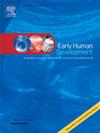Mental health screening for parents following surgical neonatal intensive care unit (NICU) discharge
IF 2.2
3区 医学
Q2 OBSTETRICS & GYNECOLOGY
引用次数: 0
Abstract
Admission to the surgical neonatal intensive care unit (sNICU) is a stressful experience. Care is often complex, with inherent risks and potential complications. This study describes the implementation of an outpatient mental health screening process for parents of infants admitted to a sNICU. Parents of infants aged >34 weeks gestation with a congenital anomaly requiring neonatal surgery participated in this prospective observational study. Standardised measures to screen for parenting stress (Parenting Stress Index™ Fourth Edition Short Form) and depressive symptoms (Center for Epidemiologic Studies Depression Scale) were administered at the first outpatient visit scheduled when the infant's corrected gestational age was 4 months. A triage algorithm was developed, to review the initial screening results prompting appropriate action and intervention. Positive screens were triaged as evaluate (assess within 48 h), targeted information (email contact), or escalate response (same day risk assessment). Demographic factors associated with parental stress and depressive symptoms were explored. Forty parents (response rate: 88 %) participated in screening. A high portion of parents (52.5 %) required secondary screening, for parenting stress (n = 10), depressive symptoms (n = 5) or both stress and depressive symptoms (n = 6). Socioeconomic disadvantage was positively associated with parenting stress (p = 0.02) and greater depressive symptoms with parent education levels (p = 0.01). Results indicate screening of parent mental health in the outpatient setting is feasible. Use of a triage algorithm helped prioritise parent follow-up and facilitate workflows. Parent mental health screening should be prioritised within and beyond the sNICU to support family and infant outcomes during this critical period of development.
新生儿重症监护室(NICU)手术出院后对父母进行心理健康筛查。
入住新生儿外科重症监护病房(sNICU)是一种紧张的经历。护理工作通常很复杂,存在固有风险和潜在并发症。本研究介绍了针对入住新生儿重症监护病房(sNICU)的婴儿家长实施的门诊心理健康筛查流程。妊娠期大于 34 周、患有先天性畸形并需要进行新生儿手术的婴儿的父母参与了这项前瞻性观察研究。在婴儿的矫正胎龄为 4 个月时,在第一次门诊就诊时进行标准化测量,以筛查育儿压力(育儿压力指数™ 第四版简表)和抑郁症状(流行病学研究中心抑郁量表)。我们制定了一套分流算法,以审查初步筛查结果,从而采取适当的行动和干预措施。阳性筛查结果被分流为评估(48 小时内评估)、目标信息(电子邮件联系)或升级响应(当天风险评估)。研究还探讨了与家长压力和抑郁症状相关的人口统计学因素。40 名家长(回复率:88%)参加了筛查。大部分家长(52.5%)需要进行二次筛查,筛查内容包括养育压力(10 人)、抑郁症状(5 人)或压力和抑郁症状(6 人)。社会经济劣势与养育压力呈正相关(p = 0.02),抑郁症状与父母教育水平呈正相关(p = 0.01)。结果表明,在门诊环境中对家长进行心理健康筛查是可行的。使用分流算法有助于确定家长随访的优先次序并促进工作流程。在新生儿重症监护病房内外都应优先考虑对家长进行心理健康筛查,以便在婴儿成长的关键时期为家庭和婴儿提供支持。
本文章由计算机程序翻译,如有差异,请以英文原文为准。
求助全文
约1分钟内获得全文
求助全文
来源期刊

Early human development
医学-妇产科学
CiteScore
4.40
自引率
4.00%
发文量
100
审稿时长
46 days
期刊介绍:
Established as an authoritative, highly cited voice on early human development, Early Human Development provides a unique opportunity for researchers and clinicians to bridge the communication gap between disciplines. Creating a forum for the productive exchange of ideas concerning early human growth and development, the journal publishes original research and clinical papers with particular emphasis on the continuum between fetal life and the perinatal period; aspects of postnatal growth influenced by early events; and the safeguarding of the quality of human survival.
The first comprehensive and interdisciplinary journal in this area of growing importance, Early Human Development offers pertinent contributions to the following subject areas:
Fetology; perinatology; pediatrics; growth and development; obstetrics; reproduction and fertility; epidemiology; behavioural sciences; nutrition and metabolism; teratology; neurology; brain biology; developmental psychology and screening.
 求助内容:
求助内容: 应助结果提醒方式:
应助结果提醒方式:


